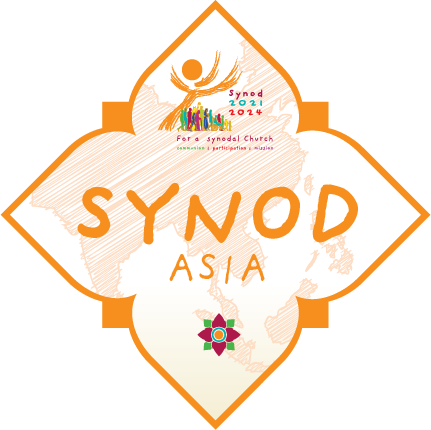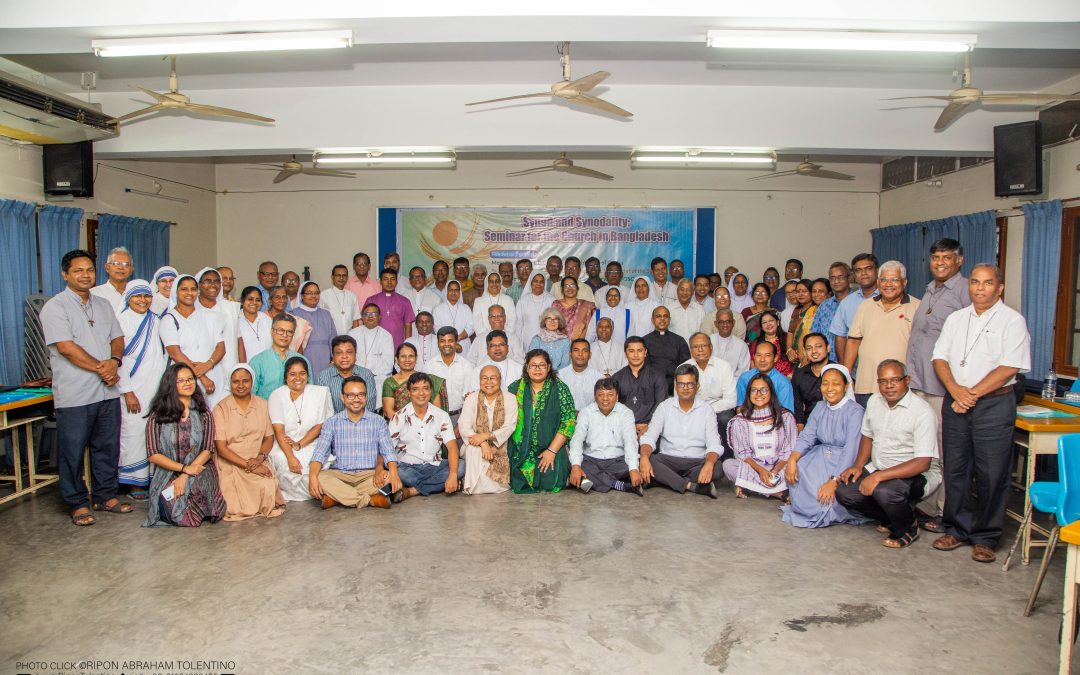Dhaka (June 30, 2024)
A three-day seminar on Synodality was held at the Catholic Bishops’ Conference of Bangladesh (CBCB) Centre in Dhaka, June 27-29, for the Catholic Church of Bangladesh.
The seminar on the theme “Synod on Synodality in the Church of Bangladesh” was animated by Sister Nathalie Becquart, XMCJ, Under-Secretary for the Secretariat of the Synod of the Vatican, and Father George Plathottam, SDB, Executive Secretary of the FABC Office of Social Communication. The seminar is the third national-level event on Synodality organised by the FABC OSC in Asian countries, the previous ones being in Cambodia and Nepal.
Participants included Cardinal Patrick D’ Rozario, former Archbishop of Dhaka, Archbishop Bejoy N. D’Cruze of Dhaka and other bishops of Bangladesh and some 80 delegates, consisting of major superiors, priests and lay leaders from the eight dioceses of the country.
The event organised by the FABC OSC in collaboration with the Secretariat of the Catholic Bishops Conference of Bangladesh (CBCB) and the Office of Social Communication (OSC), dealt with synodality as a new way of being church in Asia and the challenges the church faces in its pastoral ministry and evangelisation. The seminar studied at some depth the documents of FABC 50 called the Bangkok Document, the Asian Continental Document on Synod and the Synthesis document from the October 2023 session of the Synod in the Vatican.
Bishop Paul Ponen Kubi, Secretary of the Catholic Bishops’ Conference of Bangladesh, welcomed Sr Nathalie, Fr George and the participants to a fruitful study and reflection on synodality in the context of Bangladesh. He spoke of synod as part of the ancient tradition of the Church to discuss matters for the good of the people of God in a fraternal way.
The participants listened to the story of the journey of the two disciples on the road to Emmaus during which Jesus walked with them and spoke to them. This passage, Fr George and Sr Nathlie said forms the essence of the synodal journey of walking together with his disciples.
The seminar began with a Bible procession followed by Holy Mass presided over by Cardinal Patrick D’Rozario. In his homily, the Cardinal said, Pope Francis, like a prophet, has called for a synodal church to see things in a new way. We are called to listen attentively to others. However, over time, many worldly thoughts and values have entered the church, but we have to learn to listen to others, walk together and accept each other as part of the synodal process.
Father George Plathottam, SDB, Executive Secretary of the FABC Office of Social Communication, said, We are called to listen to the voice of the Holy Spirit as we embrace the synodal process, promoting mutual respect, cooperation, and walking together with all. We can see a revolutionary change happening in the church through this synod. Dialogue and mutual respect for each other’s culture are essential, he added.
He also stressed the importance of recognising the potential of women, youth and laity in the Asian Church. He highlighted the concerns of the Church in Asia for the poor, the migrants, refugees, and displaced people. The church is called to be inclusive, welcoming, extending hospitality, and ‘taking off shoes’ as part of the Asian synodal journey in accordance with Asian culture.
Sister Nathalie Becquart, XMCJ, Under-Secretary for the Synod of the Vatican, said, “Synodality is a dynamic vision of the church, revealed through the process of setting ongoing goals. It is like the vision of the Trinity: that leads humanity to salvation, the synodal church works to meet the needs of the age. The synod is a journey with Jesus, just as he journeyed with his disciples on the road to Emmaus.
She spoke about the synodal process and its various stages of development and led the participants through the process of conversation in the Spirit as a Synodal method. Group sessions enabled members to have a practical experience of this synodal process of listening to one another and through them to the voice of the Holy Spirit.
Archbishop Bijoy N. D’Cruze shared his own personal experience of the Synod and how the process of synodality was unfolding in the church in Bangladesh. He said, the Christian community, though a minority, is living according to the teachings of Christ, spreading his teachings, and offering Christian service in the multi-religious and cultural context of Bangladesh. Just as Jesus Christ empathized with the sufferings of others, we too must listen attentively to others, welcome and embrace others with our hearts, he said.
The Archbishop also acknowledged that within the Catholic community in Bangladesh, there are notable influences of power, money, factions, and intolerance, similar to the prevailing negative political influences and values in the country. These problems will be resolved if we can build an inclusive society in the light of Pope Francis’ call for a synodal Church.
Pius Costa, a former additional secretary of the Government of Bangladesh, expressed his feelings by saying, “My journey with brothers and sisters of other faiths requires maintaining synodality with them. I tell others that we are all servants of the Creator. Likewise, I work as your servant. I assure you that the experiences from this seminar will be reflected in my professional life.”
Sister Lori from the Congregation of the Daughters of Jesus, who participated in the seminar, said, “The Holy Spirit guides and empowers us. Therefore, establishing synodality in the light of the Church in Bangladesh requires the companionship of the Holy Spirit.”
Mrs. Rita Rosario, who participated in the event, said, “The synod and synodality are a new awakening for our Church. The Holy Father is opening a new door for us through this process, allowing us to approach each other and listen attentively.”
Archbishop Kevin Randall, the Vatican ambassador to Bangladesh, celebrated the concluding Eucharistic celebration. In his message, he said, “The Holy Father, Pope Francis, has taken a step to create a beautiful connection among everyone in our Church, helping us develop a good heart for listening to others.”
Miss Dola Baroi expressed her feelings saying, “Synodality is a gateway to new possibilities and a place of hope that will strengthen the contribution of our youth in the Church.”
###

